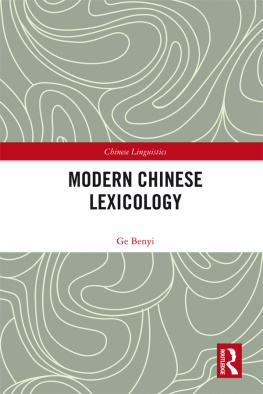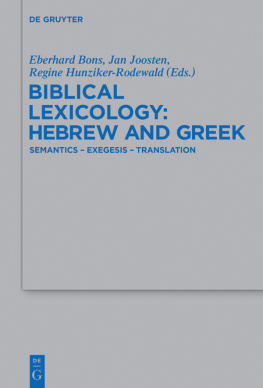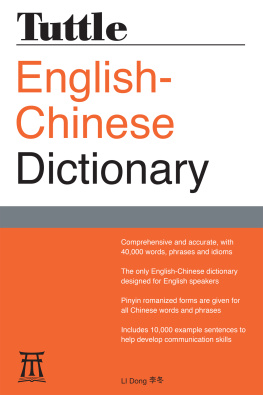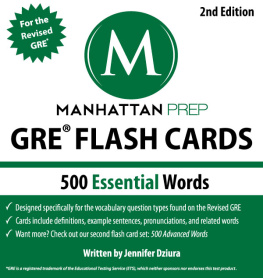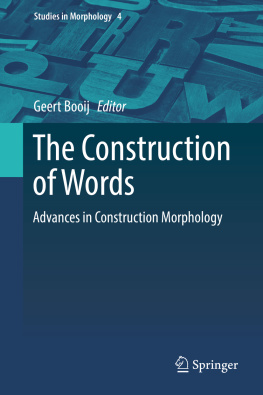Modern Chinese Lexicology
Centring on words which connect vocabulary and semantic morphemes, this book makes a systemic and in-depth analysis on the study of modern Chinese lexicology.
Firstly, it clarifies the definitions and properties of vocabulary, words and semantic morphemes in Chinese. Then the structure forms of Chinese words are examined. It is worth noting that this research is one of the first to distinguish word formation and lexical morphology. It observes that word formation studies how neologisms are coined, while lexical morphology refers to the ways in which semantic morphemes are combined with each other. On word meaning and its clustering, it discusses the relationship between word meaning and concept, as well as the criteria and principles of the clustering. Specifically, it studies monosemes, polysemes, synonyms, near-synonyms, antonyms, etc., including their characteristics and types. Lastly, it explores the evolution of word meaning and its laws, as well as the dynamic form of vocabulary.
This book will be a valuable reference for scholars and students in linguistics, especially in Chinese lexical studies.
Ge Benyi is a professor and PhD supervisor of Chinese Linguistics at the School of Chinese Language and Literature, Shandong University. She is mainly engaged in the teaching and research of Chinese linguistics with a special preference for Chinese lexicology.
Chinese Linguistics
Chinese Linguistics series selects representative and frontier works in linguistic disciplines including lexicology, grammar, phonetics, dialectology, philology and rhetoric. Mostly published in Chinese before, the selection has had far-reaching influence on Chinas linguistics and offered inspiration and reference for the worlds linguistics. The aim of this series is to reflect the general level and latest development of Chinese linguistics from an overall and objective view.
Titles in this series currently include:
Modern Chinese Lexicology
Ge Benyi
Modern Chinese Parts of Speech
Systems Research
Guo Rui
Modern Chinese Parts of Speech
Classification Theory
Guo Rui
Prosodic Syntax in Chinese
Theory and Facts
Feng Shengli
Prosodic Syntax in Chinese
History and Changes
Feng Shengli
The Experiential Guo in Mandarin
A Quantificational Approach
Ye Meng
Research on Functional Grammar of Chinese
Information Structure and Word Ordering Selection
Zhang Bojiang, Fang Mei
Research on Functional Grammar of Chinese
Reference and Grammatical Category
Zhang Bojiang, Fang Mei
For more information, please visit https://www.routledge.com/Chinese-Linguistics/book-series/CL
Modern Chinese Lexicology
Ge Benyi

First published in English 2018
by Routledge
2 Park Square, Milton Park, Abingdon, Oxon OX14 4RN
and by Routledge
711 Third Avenue, New York, NY 10017
Routledge is an imprint of the Taylor & Francis Group, an informa business
2018 Ge Benyi
Translated by Xu Dekuan
The right of Ge Benyi to be identified as author of this work has been asserted by her in accordance with sections 77 and 78 of the Copyright, Designs and Patents Act 1988.
All rights reserved. No part of this book may be reprinted or reproduced or utilised in any form or by any electronic, mechanical, or other means, now known or hereafter invented, including photocopying and recording, or in any information storage or retrieval system, without permission in writing from the publishers.
Trademark notice: Product or corporate names may be trademarks or registered trademarks, and are used only for identification and explanation without intent to infringe.
English Version by permission of The Commercial Press.
British Library Cataloguing-in-Publication Data
A catalogue record for this book is available from the British Library
Library of Congress Cataloging-in-Publication Data
A catalog record for this book has been requested
ISBN: 978-1-138-57661-2 (hbk)
ISBN: 978-1-351-26952-0 (ebk)
Typeset in Times New Roman
by Apex CoVantage, LLC
Contents
The first edition of Modern Chinese Lexicology was published in 2001, and its revised edition was published in 2004. After the publication of the book, strong supports from readers have been received and it has been reprinted eight times in ten years and the supply still falls short of demand up to now. Apart from being grateful, I am here only to express my deep respect and gratitude to my friends and readers who support me.
Now the Commercial Press is taking over publishing the book, so I took advantage of this opportunity to make further revisions as much as I could for the sake of perfection. The major revisions include but are not limited to:
- First, necessary supplements were made to the points which had not been thoroughly discussed before.
- Second, improper examples were replaced as much as possible.
- Third, modifications to the elaborations that were not clear enough and corrections to the occasionally few typos were made.
- Fourth, some major references were supplied at the request of the readers. The references are listed in chronological order, the purpose of which is just to let the readers know that it is in this process that I learned and studied Chinese lexicology, and it is in the nourishment and inspiration of these works that I keep moving forward.
It was another revision, though, I dont think it is possible to reach the acme of perfection in learning, and I still sincerely wish that all my friends and readers will continue to make valuable comments.
Ge Benyi
Shandong University
June 2012
The present little book, Modern Chinese Lexicology, is an integration of my former book, A Study on Chinese Vocabulary, and the researches, thinking and writings of more than ten years in the past. It may also be said a monograph to have ensembled my current researches on Chinese vocabulary.
I began to be interested greatly in vocabulary while I was teaching the course introduction to linguistics after my graduation and was enrolled as a teacher by my Alma Mater in 1955. Since then, I have been consciously or unconsciously willing to learn, observe and think about problems in Chinese vocabulary. During the long fifty years or so, I have not only enjoyed myself but also gained a lot from it. My book Vocabulary of Modern Chinese was published in 1961. Although this little book was only one of my works of apprenticeship, its publication gave me invaluable encouragement and confidence. I began to do my own studies: on the basis of learning the research findings of former and contemporary scholars, I began to go my own way and learn to speak my own words.
A Study on Chinese Vocabulary was published in 1985. Due to the limitations of the academic level and conditions of study at that time, it was a little bit simpler because some problems have not even been mentioned. But I am still consenting to the many points of view in that book at present; therefore, I will continue to use them in this book, except that some new ones are to be added and others are to be modified to a certain extent. Furthermore, some new ideas and contents are to be added and some new questions are to be discussed.

